Performance, speed and reliability
Every time we think we've cracked this SSD
testing lark, it just gets tougher.
In the early days, it was all about raw
sequential grunt. Then it became clear that drives performed differently with
compressible and incompressible data, so that had to be factored in.
Of course, real-world PC performance
depends on much more than mere sequential throughput, so random access
performance was stirred into the mix. Bung in some actual application tests and
we were beginning to think we had a pretty good feel for overall drive
performance.
And so we were, but only at a given moment
in time, and a given state of drive usage and wear. Unfortunately, the reality
is that fully torture-testing every solid-state drive we review to destruction
is impractical. We'd need months if not years with each drive, and by the time
we finally published our results, the model in question would probably have
disappeared.
However, what we've added to our standard
battery of tests this time around is an extra endurance test. We always fill
and then empty each drive of data before testing, but this time we added
another two fill and delete cycles, then compared the drives before and after
performance. The results are certainly interesting.
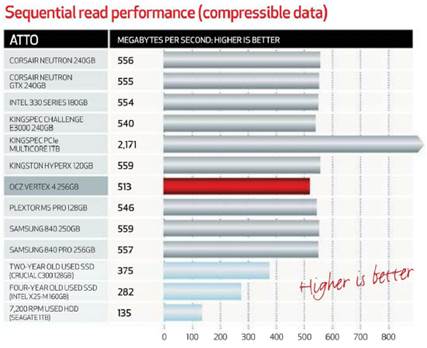
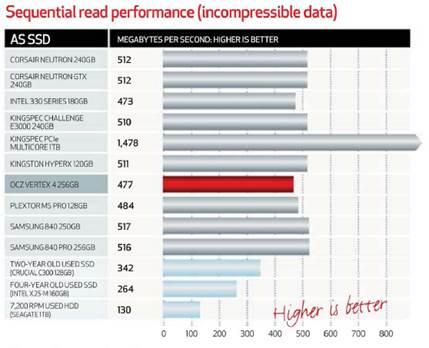
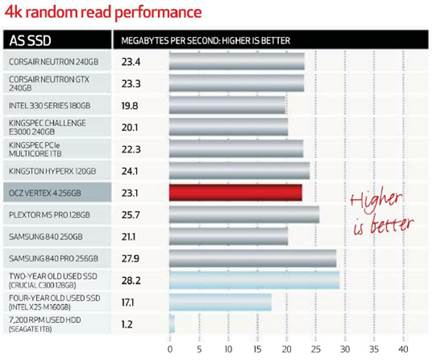

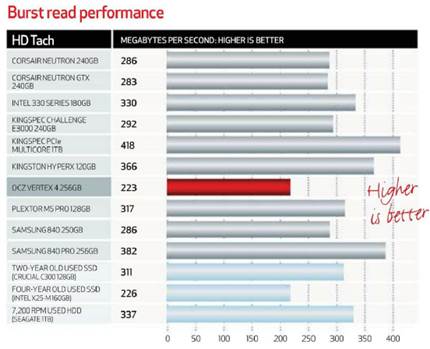
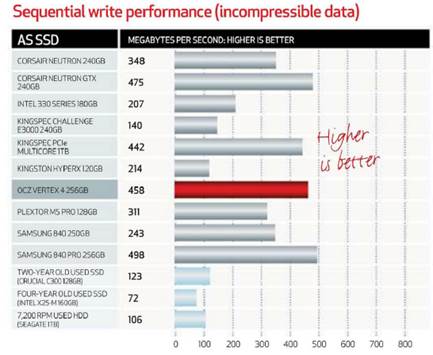
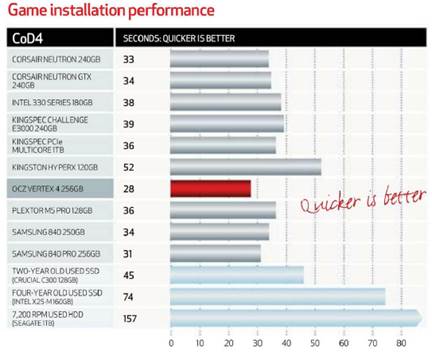
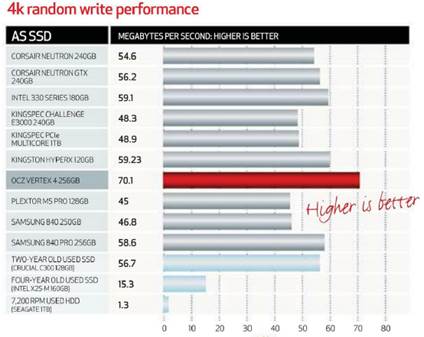
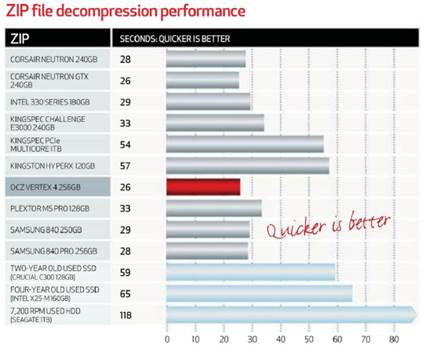
Winner is...
OCZ Vertex 4 256GB
Things change fast in SSD land. A year ago,
it was all about previously little known outfit SandForce. Today, SandForce
isn't exactly dead, but the competition is significantly more lively.

What's really interesting, however, is the
mix of players and technologies involved. On one hand you have the likes of
Samsung, the mega beast of tech, pushing the envelope with its new triple-level
cell memory and fourth generation in house controller. On the other, you've got
relative minnow OCZ cooking up a remarkably competitive alternative with its
own Indilinx controller technology. Then there's a whole bevy of players
pulling together interesting SSDs using a mix of off-the-shelf tech and some
agile thinking.
It's all very different from CPUs and
graphics cards, where two major players dominate the key technologies. For the
most part, that makes the SSD market more fun, vibrant and competitive.
Test of time
But there's another side to the wild west
of SSDs, and that’s the frustrating fact that performance and reliability
remain patchy. With the best will in the world, it's hard to know how reliable
any SSD is going to be, or how well its performance will hold up with heavy
usage.
To be clear, a lot of progress has been
made. The awful, stuttery drives of a few years ago are history, but we’re not
yet at the point where SSDs just work where you can choose based on simple
metrics of price and performance.
Choosing a pecking order for this batch of
SSDs isn't easy, but a few are immediately defenestrated due to wonky
performance numbers or silly pricing. The first to go is KingSpec's epic 1TB
PCIe card. In some tests it delivers the 2GB/s goods. In others, it's slower
than a $112 SSD. That's not nearly good enough given the $1600 sticker.
Other losers are the Plextor M5 Pro,
KingSpec E3000 and Corsair Neutron GTX. Whatever you say about them and the
Plextor and Corsair are good drives they're simply too expensive. Kingston's
HyperX BK takes an early bath due to poor application performance.
From here on in, the competition is very
close. In fact, it's even closer than our scoring suggests. That's because
we've included a wide range of metrics in our reckoning. But it's entirely
legitimate, for instance, to favour reliability above all else, in which case
an older, proven drive not in this group like Samsung's 830 might get the nod.
With that in mind, you might find Intel's
330 Series compelling. Nobody does more validation work than Intel. Then again.
Corsair's Neutron balances performance and price pretty nicely, as does
Samsung's new 840, though you’d arguably give Samsung the benefit of the doubt
regards reliability.
That leaves us with two drives: Sammy’s new
840 Pro and the OCZ Vertex 4. If there’s ever been a tighter finish on a group
test here on PC Format, we can’t remember it.
You can make strong arguments for both
drives. The 840 Pro is super quick and comes with Samsung's outstanding record
for SSD endurance, but the Vertex 4 is even quicker, and dirt cheap. The choice
comes down to your attitude towards risk. The Vertex 4 has a five-year
warranty, so if the worst happens, you're covered. But a loss of data can be
worse than the cost of a drive, and we have first-hand experience of failing
Vertex 4s.
So good is the Vertex 4’s performance (and
that includes our endurance test), we feel compelled to give it top honours,
but even so we still find it hard to ignore an older, proven SSD. You pays your
money. You takes your choice.
|
|
Corsair Neutron 240GB
|
Corsair Neutron GTX240GB
|
Intel 330 Series 180GB
|
KingSpec Challenge E3000240GB
|
KingSpec PCIe MultiCorelTB
|
|
Manufacturer
|
Corsair
|
Corsair
|
Intel
|
KingSpec
|
KingSpec
|
|
Web
|
www.corsair.com
|
www.corsair.com
|
www.intel.com
|
www.kingspec.com
|
www.kingspec.com
|
|
Price
|
$256
|
$304
|
$164.8
|
$281.6
|
$1720
|
|
Capacity
|
240GB
|
240GB
|
180GB
|
240GB
|
1TB
|
|
Memory type
|
MLC synchronous
|
MLC toggle
|
MLC synchronous
|
MLC synchronous
|
MLC synchronous
|
|
Controller
|
Link A Media LM87800
|
Link A Media LM87800
|
SandForce 5F-2281
|
SandForce SF-2281
|
SandForce SF-1200 x8
|
|
Claimed endurance
|
2m hours MTBF
|
2m hours MTBF
|
1.2m hours MTBF
|
1.3m hours MTBF
|
2m hours MTBF
|
|
Warranty
|
5yrs
|
5yrs
|
3yrs
|
2yrs
|
2yrs
|
|
|
Kingston HyperX
120GB
|
OCZ Vertex 4 256GB
|
Plextor MS Pro 128GB
|
Samsung 840 250GB
|
Samsung 840 Pro 256GB
|
|
Manufacturer
|
Kingston
|
OCZ
|
Plextor
|
Samsung
|
Samsung
|
|
Web
|
www.kingston.com
|
www.ocztechnology.com
|
www.plextor-digital.com
|
www.samsung.com
|
www.samsung.com
|
|
Price
|
$124.8
|
$246.4
|
$204.8
|
$256
|
$334.4
|
|
Capacity
|
120GB
|
256GB
|
128GB
|
250GB
|
256GB
|
|
Memory type
|
MLC synchronous
|
MLC synchronous
|
MLC toggle
|
TLC toggle
|
MLC toggle
|
|
Controller
|
SandForceSF-2281
|
Indilinx Everest 2
|
Marvell 885S9187
|
Samsung MDX
|
SamsungMDX
|
|
Claimed endurance
|
1m hours MTBF
|
2m hours MTBF
|
2.4m hours MTBF
|
1.5m hours MTBF
|
1.5mhoursMTBF
|
|
Warranty
|
3yrs
|
5yrs
|
5yrs
|
3yrs
|
5yrs
|